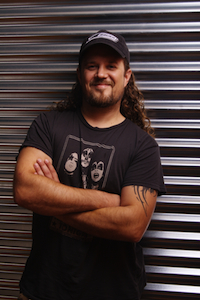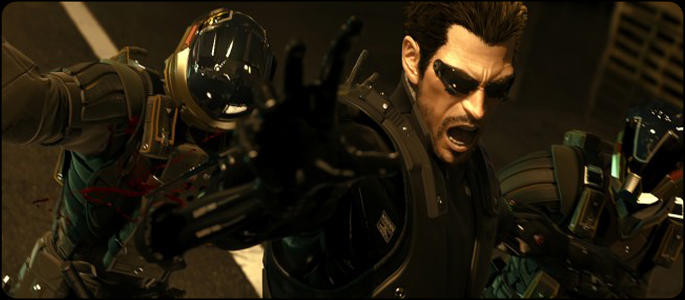
PlayStation LifeStyle: From what we saw in the demo, it is obvious a lot of work went into creating ambiance in the game. Approximately how much non-critical audio is there?
Steve Szczepkowski: While I don’t have an exact number for you, I can tell you we recorded just under 20,000 lines of dialog for the game. A good part of that is to create that actual immersive ambiance you mentioned. We have overt conversations going on throughout the city. We decided early on that that added a better sense of reality and immersion than just having ambient chatter “baked in [Using pre-made/purchased audio].” These really seem to bring the game to life, as you walk through the city and pick up bits of conversation here and there and everywhere – that’s reality. So trying to get as close to that as possible in the game helps to sell the immersive factor.
With the game being in a futuristic setting, how much fun do you get to have with applying filters or otherwise tweaking audio?
Unfortunately, we’re only 17 years in the future, so we couldn’t go hog-wild and start creating cool light sabers and TIE-fighters and stuff like that, which would have been fun. But at the same time, we made a decision that we wanted most of the stuff to be grounded in reality today. Every day the brain is constantly analyzing data that’s being fed to it through the senses, and it does almost a check list: if a cat says “meow,” then your brain’s already on to 20 other things saying “does this thing sound right, does it look right?” If the cat all of a sudden had the sound of a cow, your brain would stop right there and everything would stop, you would turn to look at that cat and go “that doesn’t sound right.” The same thing can be applied in creating sound design. You want everything to be interesting and to sound such a way that the brain’s going to accept it and not stop and look at it in a negative way, because at that point, you’ve broken the spell of the game. The player’s not paying attention to the dialogue anymore, he’s not paying attention to certain cues he’s being given – he’s focusing on something that doesn’t sound right or is confusing him. So that’s bad sound design, and that’s something we try to stay away from. Where I think we really added the futuristic element was in the weapons, to try to really flesh out the weapons – get them to sound “meaty,” get them to sound somewhat realistic, but with a slight edge of futuristic to give them a bit more punch.
Award-winning Michael McCann is the composer for the game. How satisfied with his work are you?
Mike McCann has been an amazing contribution to this game. Working with him has just been awesome. It’s probably one of the best choices I’ve made in picking Mike because he’s nailed the Deus Ex experience/sound. I really feel that he’s put his signature on it, but as well he’s taken all the great elements that were in the first game and flushed them out in today’s sound, and I think all those elements are in the music that’s in the first game today, just being served up differently.
Have you had a moment in the development process that just made you go “Wow!” and give you goosebumps?
Yeah, I’d probably say that one of the first times I saw our AI start to act the way we wanted it to, there was a point where I think we were walking around in stealth, and they just started chattering, like “did you hear something?” and the other guy’s answering “yeah, what was that?” and I just thought, “wow, this is really starting to come to life, this is really cool.” You really sense that you have a sort of stress in the game just because they were talking about you, and you were hiding right there. That was a real cool moment, that was my first sort of “wow” moment, where I thought “yeah, this is really cool, this is going to be something good.”
Finally, now that you’re fairly close to launch, what is a typical day like for you now?
A typical day is where I come in, and say to myself “alright, we’re going to get a lot done today.” And then by noon I’m still running around, putting out fires, taking care of things, making sure X talks to Y and Y talks to Z…Some days are quiet, and you get to get your hands in the game, play builds, and do stuff, and then other days it’s like running around, I wouldn’t say like a chicken with your head cut off, but you’re like a fireman going from one nine-alarm fire to another. Just trying to make sure everything is getting done the way it should be and with the quality it should. So there’s a certain amount of time that gets spent on quality control. Thankfully, I’ve got a great team, and I can always count on them to always be pushing that bar, and they always do. But more of the problems is just that any time you’re dealing with a production with a hundred plus people, there’s always that chance of miscommunications and things falling in the cracks. So there’s a lot of time and energy spent just making sure everybody is talking to everybody else, and that they’re doing great stuff, what they’re supposed to be working on. Not the most exciting answer, the most interesting answer is that there are some days of pure insanity and craziness, and you get home and you’re like, “where did the time go?” There’s also those days where you do get quiet moments to play a build, and walk out with a smile going “okay, yeah, that’s what we’re doing!”
PlayStation LifeStyle would like to thank Steve Szczepkowski for taking time from his busy day to answer our questions. Stay tuned for more interviews over the coming days!








